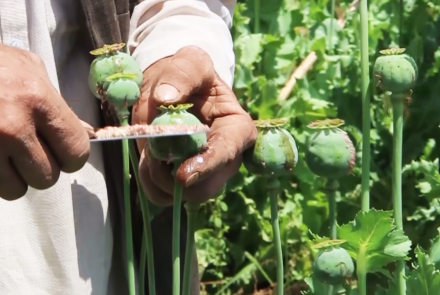The United Nations Office on Drugs and Crime (UNODC) reported that the price of one kilogram of opium in Afghanistan has increased tenfold compared to 2022.
According to this report, opioid reserves at the end of 2022 were estimated at approximately 13,200 tons, which could meet the demand for Afghan opium until 2027.
The report said that in 2024, the price of one kilogram of opium in Afghanistan reached $750. Despite the decline in production, high opium prices continue to benefit major traffickers.
UNODC stated that the reduction in drug production following the Islamic Emirate’s ban has led to a decrease in heroin and opium trafficking. Since 2021, the seizure rate of these substances has dropped by around 50%.
“Dry opium prices in Afghanistan have sharply increased on several occasions over the last three years. The long-running average was around US$75 per kilogram before the DfA took over. In the latter half of 2021 until the announcement of the drugs ban in April 2022, trade prices for a kilogram of opium increased to around US$110. Prices jumped to around US$300 a kilogram at the beginning of the following season’s sowing period in 2023. By the start of the sowing period for 2024, prices had jumped to ten times higher than the long-running pre-ban average and about four times higher than when the ban was announced,” the report reads.
UNODC also said that total opium reserves just before the cultivation decline in 2023 could have been valued between $4.6 billion and $5.9 billion, potentially mitigating Afghanistan’s economic challenges following the Islamic Emirate’s return to power.
The report highlights that only 30% of Afghan farmers had small or medium-sized reserves in 2022, indicating that most opium cultivators are likely facing financial difficulties.
“After the poppy ban, we need alternative crops. In addition, we require access to improved seeds, chemical fertilizers, and agricultural medicine. These were previously provided by institutions, but now they have stopped,” said Bakht Mohammad, a farmer.
“Organizations working to prevent drug trafficking must recognize that Afghanistan, like other countries, requires support,” said Sadiq Shinwari, a political analyst.
Meanwhile, the Islamic Emirate considers the rise in opium prices as proof of its strong anti-drug efforts.
Abdul Matin Qani, spokesperson for the Ministry of Interior, stated in a video message: “When production and supply are absent, prices naturally multiply. The UNODC report confirms the Islamic Emirate’s seriousness in eradicating drugs from the country.”
This comes as Hossein Zolfaqari, the secretary-general of the Iranian Drug Control Headquarters, recently claimed during a Vienna conference that heroin and methamphetamine are being produced underground in Afghanistan, calling it a “serious threat.”



